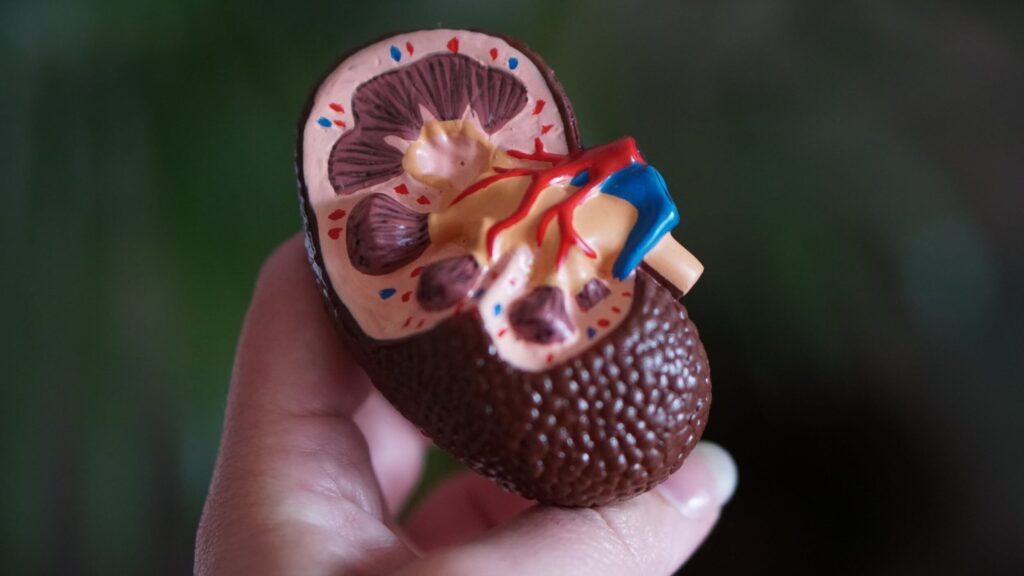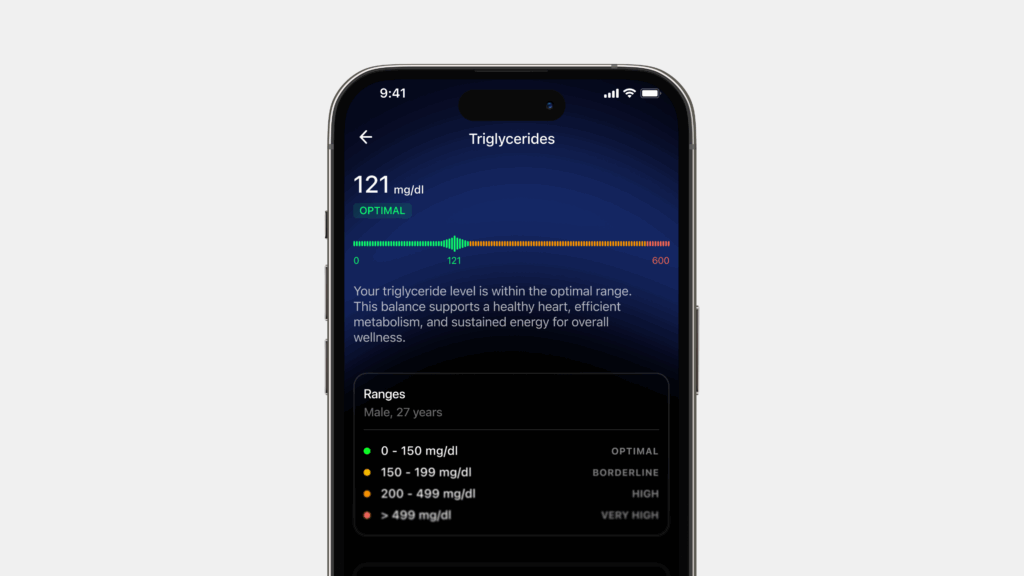The kidneys play an important role not only in removing waste from the body but are also responsible for the regulation of water, salts and minerals—such as sodium, calcium, phosphorus and potassium—in your blood. These small organs are about the size of a fist and produce hormones that help make red blood cells, control blood pressure and keep bones strong. When kidneys don’t function well, toxins and excess fluid can build up in the body, which can lead to serious and even life-threatening health impairments. While there are several causes of chronic kidney disease, both high and low levels of blood sugar can trigger the onset of these dysfunctions. Blood sugar control and maintaining glucose homeostasis is critical in preventing these illnesses.
Kidney function
Kidneys are two bean-shaped organs located in the rear part of the abdominal cavity, below the ribcage. A fibrous renal capsule surrounds each kidney with two layers of fat that serve as protection. (22)
Blood is carried into the kidneys through the renal artery and exits through renal veins. About a million filtering units known as nephrons make up each kidney. (23) Each nephron has a filter, also referred to as a glomerulus, and a tubule, which removes waste. The glomerulus is a cluster of tiny blood vessels that filters the blood and allow small molecules of water and waste to pass through to the tubule. A blood vessel runs next to the tubule and reabsorbs nutrients that the body needs. As foods are broken down, liquid waste known as urea is produced. (24) Water and chemicals may be removed or added to the tubule to produce urine, which is carried down tubes known as ureters to the bladder to be eliminated from the body. The bladder, ureters and kidney are all part of the urinary tract.
Blood circulates through the kidney dozens of times a day, and the kidneys balance the volume of electrolytes and fluids in the body, which is a process known as homeostasis. About 200 quarts (or 189 litres) of fluid run through the kidneys daily, of which about 198 quarts (or 187 litres) are reabsorbed, while approximately 2 quarts (or 1.9 litres) of fluid a day are excreted as urine. (20)
Kidney function and blood glucose
Glucose is the body’s main source of energy. Your body makes glucose from the foods you eat. The level of sugar in your blood rises and falls throughout the day in order to balance your body’s needs. (2) Blood sugar is at its lowest point first thing in the morning before one has eaten anything and it is seen to rise after meals.
The body works to keep glucose at a moderate level, which provides the body with needed energy but doesn’t overload the bloodstream. (10) If your blood glucose is too high or too low, it can affect your kidney function and overall health.
Blood glucose levels outside the normal range, with or without diabetes, can cause complications. Abnormal glucose levels can lead to the following conditions:
- Hyperglycemia: This occurs when the blood glucose is too high. (7) Blood sugar can rise to too-high levels if your body doesn’t make enough insulin or is unable to use it right away. Hyperglycemia can be triggered by severe illness, infection, excess carb intake, a sedentary lifestyle, stress and certain medications.
- Hypoglycemia: This occurs when one has low blood sugar. (9) The possible causes for this include drinking heavily without eating, hormone deficiencies, insulin overproduction and critical illnesses such as kidney disorders, hepatitis and cirrhosis.
The kidneys make a significant contribution in glucose homeostasis (21), reabsorbing substances that the body must conserve, filtering plasma and secreting substances that must be eliminated. Gluconeogenesis is the creation of new glucose from non-carbohydrate sources. The glomeruli filter approximately 180 grams of glucose each day from plasma.
The kidneys reabsorb as much glucose as possible through glucose-transporter proteins that are present in the cell membranes of the proximal tubules. This means that when the kidneys are healthy, the urine is close to being glucose-free. If there’s more glucose than the transporter can handle, some of it ends up in the urine.
Too much glucose in the bloodstream can cause the kidneys to work extra hard. This puts pressure on the nephrons and, over time, their filtering ability becomes less efficient. Useful proteins may leak out of the kidneys into the blood, leading to the build-up of waste. This is a serious condition called nephropathy. (28)
Blood glucose levels are measured in milligrams per decilitre (mg/dL). (11) The target blood glucose level for each individual can vary based on age, health conditions and other factors. A general guide is that a person without diabetes should have blood sugar between 72–99 mg/dL before eating and a level that’s less than 140 mg/dL after eating. For a person with diabetes, the blood sugar should usually be 80–130 mg/dL before eating and less than 180 mg/dL after eating. Talk to your doctor about your personal targets.
Prediabetes
xBlood sugar problems don’t happen instantly. Insulin is the hormone that facilitates the absorption of blood sugar into the cells from the bloodstream. When cells don’t respond efficiently to insulin, this function is impaired and insulin resistance develops. Prediabetes is a condition where an individual’s blood glucose levels are higher than usual but do not pass the threshold to be considered a diabetic. (5)
A person with prediabetes may still show signs of kidney damage, which may be reflected in a reduced estimated glomerular filtration rate (or eGRF), a test that measures how well the kidneys are working. There may also be signs of an abnormal amount of protein in the urine, which is known as albuminuria.
People with prediabetes are likely to develop type 2 diabetes within 10 years—unless they make important lifestyle changes, such as incorporating exercise and movement in their routine, eating well-balanced meals and losing weight. Even before type 2 diabetes develops, long-term damage to the body may already be underway in individuals with prediabetes, including kidney disease and damage to the heart and blood vessels.
Blood glucose and chronic kidney disease
xAccording to the National Kidney Foundation, 37 million people in the United States, which is 1 in 7 adults, suffer from chronic kidney disease. (29) This condition is characterized by some type of kidney abnormality and decreased kidney function for 3 months or longer. Most people don’t know they have kidney disease, because the symptoms may not ensue until the late stages.
Chronic kidney disease is progressive. (18) Once symptoms develop, damage to the kidney may be irreversible. If one kidney stops functioning correctly, the other can still continue to function.
Most kidney diseases attack the nephrons (26), making it difficult for the kidneys to remove waste. As chronic kidney disease worsens, wastes can build to high levels in the blood and can lead to complications like nerve damage, anemia and high blood pressure. Early detection and treatment may help to keep chronic kidney disease from getting worse.
A person who has both diabetes and chronic kidney disease is at the highest risk of having problems with low blood sugar. (12) If you have chronic kidney disease but don’t have diabetes, changes in appetite may still trigger low blood sugar. Treatment of chronic kidney disease involves working on slowing down the progression of kidney damage. (15) This is usually done by treating the cause. Blood sugar levels and blood pressure need to be tightly controlled. (16)
Maintaining healthy blood glucose levels
Poor control of blood sugar and hypertension are known to increase the risk of kidney damage. When the blood sugar is either too high or too low, the kidneys become less efficient. Keeping blood sugar in the target range can prevent or delay health problems (6) that can be caused by high blood sugar. High blood pressure can constrict blood vessels, weakening them throughout the body. This narrowing of the blood vessels reduces blood flow to the kidneys, making it harder for them to work properly. (30)
You could try the following to maintain healthy blood glucose levels (27) and to help protect the health of your kidneys (19):
- Consume a healthy and balanced diet that includes plenty of fruits and vegetables and fewer refined carbohydrates.
- Undertake regular physical activity. A study showed that 60 minutes of cycling on a machine at a medium pace enhanced insulin sensitivity for 48 hours among healthy individuals. (31)
- Cut back on salt. Too much salt makes it harder for the kidneys to remove fluid, which can increase blood pressure and cause the stiffening and narrowing of blood vessels over time. (32)
- Learn to manage stress.
- Make sure you’re getting enough sleep.
- Drink plenty of water.
- Limit the use of over-the-counter pain medicine, which can be damaging to your kidneys
Conclusion
The kidneys play a remarkable role in filtering the blood, reabsorbing what’s needed by the body and removing waste products that need to be eliminated. Their role is critical in modulating the level of fluids and electrolytes in the body.
Glucose is the body’s main source of energy. When there is an imbalance in glucose levels, the kidneys may not be able to function efficiently. Both hyperglycemia and hypoglycemia can damage the kidneys over time. High levels of glucose in the bloodstream can cause the kidneys to work overtime. This puts pressure on the nephrons in the long run, impairing their filtering ability and leading to nephropathy (deterioration of kidney function). Keeping blood sugar as close to a target range as possible can help prevent problems related to blood sugar variability.
Disclaimer:The contents of this article are for general information and educational purposes only. It neither provides any medical advice nor intends to substitute professional medical opinion on the treatment, diagnosis, prevention or alleviation of any disease, disorder or disability. Always consult with your doctor or qualified healthcare professional about your health condition and/or concerns and before undertaking a new healthcare regimen including making any dietary or lifestyle changes.
References
- https://www.kidney.org/atoz/content/about-chronic-kidney-disease
- https://www.healthywomen.org/content/article/know-your-blood-sugar-basics-0
- https://www.webmd.com/diabetes/ss/slideshow-blood-sugar-terms
- https://www.diabetes.co.uk/body/kidneys.html
- https://www.kidney.org/news/kidneyCare/Summer10/PreDiabetes







